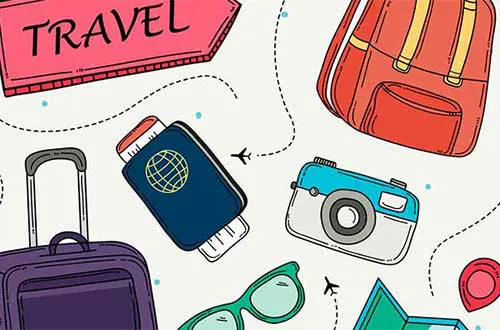Recommended Vaccinations and Medical Suggestions for Travel to China

Vaccines
If you're planning to travel to China, there are several key vaccines that are strongly recommended before you enter the country. The good news is that several of these vaccines are usually given to children and adults around the world, so you may already be caught up on these.
- MMR: The measles, mumps and rubella vaccination is strongly recommended for everyone as these viruses can be spread through a variety of methods.
- TDAP: The tetanus, diphtheria, and pertussis vaccine is strongly recommended for all travelers. Tetanus is readily spread through wounds, while pertussis is airborne.
- Chickenpox: The chickenpox vaccine is traditionally given to people who have not already been infected with chickenpox in their lifetime.
- Influenza: The influenza vaccine helps protect against the flu. People should generally receive the vaccine annually, as the protective strains change from year to year.
- Hepatitis A: Most people benefit from getting a Hepatitis A vaccination before their travel to China because there is an increased risk from getting it, such as through contaminated food, while visiting the country.
- Typhoid: Many people are at risk for getting typhoid while traveling in China, especially if you are going to rural areas or may be a more adventurous eater.
Other vaccines may be recommended if you fall into certain categories. For example, immunocompromised individuals should receive additional vaccines, such as the pneumonia vaccine.
- Meningitis: Students and other people who may be higher at risk should strongly consider getting a meningitis vaccination before traveling to China.
- Polio: The polio vaccine is strongly recommended for all travelers who may be visiting at-risk areas such as humanitarian aid settings.
- Hepatitis B: People who may be higher at risk should consider a Hepatitis B vaccination, such as those who may have sex with multiple partners or are planning to get a tattoo in China.
- Rabies: The rabies vaccine is recommended for people who may come into contact with infected animals, such as veterinarians, and those who may be participating in outdoor activities such as camping that may put them at a higher risk of contact with infected animals including bats and dogs.
Medical Recommendations
The Novel Coronavirus
The novel Coronavirus, also known as COVID-19, is a threat to people around the world. Travel, particularly to high population density areas, increases your risk of exposure to the virus. The good news is that levels of vaccination are increasing as of September 2021, and many locations are taking extra care to minimize the possibility of new infections. But keep social distancing and wearing a mask is highly suggested when you are travelling. Please wearing a mask when you are taking the public transportations, or in shopping malls, vehicles, indoor spaces, and any outdoor spaces where social distancing is not possible.
How to Stay Healthy and Avoid Sickness

When you are in China, it is important to only drink bottled water or boiled water. Avoid drinking water directly from the tap or using ice cubes that have been made with tap water. Other drinks that should be safe to consume include carbonated drinks and hot coffee or tea. Consuming tap water can lead to health issues such as traveler's diarrhea.
When you are eating in China, take care to eat foods that are cooked fresh and served hot rather than at room temperature. Pasteurized dairy products are also usually a safe bet. Ensure your meat is fully cooked before eating it. You should also wash fresh fruits and vegetables in clean water or peel them yourself before eating them to minimize the possibility of ingesting germs.
Prepare for Traveler's Diarrhea
Traveler's diarrhea is a catch-all term used to describe gastrointestinal infections that may affect travelers. While you can get exposed anywhere in the world, it's especially important to be prepared and minimize the possibility of infection when you are traveling.
Potential sources of traveler's diarrhea include eating undercooked meat or drinking contaminated water. Eating food that has been improperly prepared or even eating properly prepared food with dirty hands can get you sick.
To help prevent traveler's diarrhea, practice good hygiene and always wash your hands before touching your face or eating. Make sure your food is cooked completely and that you drink only treated or bottled water. You should also consider avoiding buffets, where the food may sit out for long periods of time. We suggest the following guidelines, "boil it, cook it, peel it, or forget it!"
When you travel, come prepared for traveler's diarrhea. You can bring along medications such as Pepto-Bismal or loperamide to help treat gastrointestinal upset. If you are sick for several days or have pre-existing health conditions, you should seek medical care.
Bring Documentation of Any Medications
Drugs are illegal to bring into the country or to purchase in China, so you'll want to ensure that you have the proper documentation for any of your medications, such as bringing them in their originally prescribed pill vials. Having documentation of all of your medications, as well as any health conditions you may have, is important when traveling. If you get sick, you'll want to be prepared with all available information for your medical team, although many areas have physicians who speak English.
Reduce Exposure to Outdoor Animals
When you are traveling, you may come into contact with wild or feral animals, particularly if you are spending time outside of major cities. Diseased animals are more apt to bite or scratch, and they can transmit diseases such as rabies.
Do not touch animals that you don't know or feed them, which can encourage them to come closer and potentially expose members of your party. Avoid areas infested with rodents and their urine and fecal matter, which can transmit diseases such as Leptospirosis. Use extreme caution around potential rabies vectors, such as bats, monkeys, and dogs.
If you get injured, wash the area well with soap and water. Seek medical care immediately, particularly if you encounter a situation such as waking up in a room with a bat, which has been associated with rabies transmission. Once you get back into your home country, you should follow up with your regular physician and inform them about the event, in case you need to receive post-exposure rabies care or antibiotics.
Maintain Personal Safety
Visiting China is a wonderful experience and not without its risks. The good news is that it is safer than many other areas of the world. That said, pickpockets and thieves are still present, particularly in areas with many tourists, such as around historic sites or busy market places.
 Summary of China Travel Tips
Summary of China Travel Tips  Is It Safe To Travel To China?
Is It Safe To Travel To China?  Chinese Money
Chinese Money  China Packing Tips
China Packing Tips